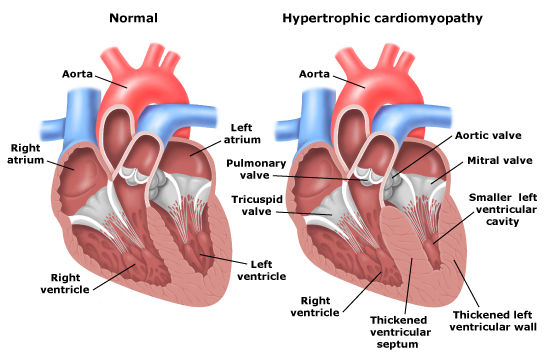
What is cardiomyopathy?
Cardiomyopathies are primary diseases of the heart muscle (myocardium). The muscles can be abnormally thick, stiff or weak or any combination. It affects the heart’s ability to fill or pump blood at normal pressure and maintain its rhythm. There are different types of cardiomyopathies, including:
- Dilated cardiomyopathy: It this condition, heart muscles are weak in strength and heart enlarge in size. The diseased heart is not able to pump blood to satisfy requirement of body. Some children who have a dilated heart have no symptoms, while others develop heart failure (difficulty breathing, difficulty eating, excessive sweating and poor growth).
- Hypertrophic cardiomyopathy: It is characterized by excessively thickened one or both ( left and right) pumping chambers (ventricles) of heart. This type of cardiomyopathy is often associated with abnormal heart rhythms, which can lead to sudden death. Hypertrophic cardiomyopathy may run in families; members of affected families are encouraged to undergo screening.
- Restrictive cardiomyopathy: The chambers of the heart are excessively stiff. Heart muscles can not relax, so that it cannot fill with blood adequately at normal pressure. Abnormal heart rhythms may also occur with this disease.
- Noncompaction cardiomyopathy: It is characterized by spongy heart muscle of left ventricle on echocardiographyand cardiac MRI. It is possible result of incomplete heart cell maturation. It can exist alone or along with other structural ( congenital ) heart disease. Pumping function of heart can be normal or reduced as seen with dilated cardiomyopathy. The heart, while noncompaction cardiomyopathy can also be diagnosed at any age from fetal age to young adult to elders.

Causes
- Familial/ inherited: Most cases of hypertrophic, restrictive cardiomyopathies and large chunk of dilated cardiomyopathies are familial. It can be result of altered protein synthesis/ storage disorders etc.
- Myocarditis: as result of viral or bacterial infection, heart muscle can develop weakness and manifest as dilated cardiomyopathy.
- Drugs and toxins: Chemotherapy agents and some environmental toxins are known to cause dilated cardiomyopathies.
- Idiopathic: There is no identifiable cause.
Signs and symptoms of cardiomyopathy
Symptoms of cardiomyopathy vary widely in type and severity. It can present at any age from fetus, neonate to adulthood.
- Difficulty breathing
- Poor exercise tolerance
- Sweating
- Poor weight gain
- Heart murmur
- Irritability, lethargy or unresponsiveness
- Syncope
- history of survivor sudden cardiac death or documented ventricular tachycardia
- Sudden death in family including occasional intra uterine fetal death
Sometimes symptoms don’t appear until the child is older. They can include:
Testing and diagnosis
Diagnosis of cardiomyopathy may include:
- Fetal 2D echocardiogram: In case of positive family history, fetal scanning may give idea about affection of fetus.
- 2D echocardiogram: It gives detail information of heart structure including heart muscle thickness and function.
- Electrocardiogram (ECG or EKG): It gives idea about chamber enlargement.
- Cardiac magnetic resonance imaging (MRI): More informative about nature muscle disease.
- Cardiac catheterization: It gives more idea about nature of heart disease and suitability for heart transplant. During cardiac catheterization, the doctor might take biopsies (tiny pieces of heart tissue), which will be evaluated in a laboratory.
- Family screening: As this condition runs in family, it is vital to diagnose affected individuals in family. It can help to formulate preventive therapy to avert sudden cardiac death.
- Genetic screening: In a few cases it offers definitive diagnosis.
Treatments for cardiomyopathy
Treatment of cardiomyopathy is aimed at controlling symptoms, preventing progression of heart failure and decreasing chances of sudden cardiac death
Medicines
These medicines can help to decrease the size of a dilated heart, relax the heart, increase the pumping strength, regulate the rhythm of the heart, or help in some other way. Often several medications are used in combination.
Pacemakers and implantable defibrillators
It can be used to use maximal tolerated doses of medicines. Also it help to restore rhythm incase of ventricular tachycardia.
Septal myectomy
Patients with hypertrophic cardiomyopathy (HCM), can have interventricular septum bulging into the left ventricle leading to obstruction. In cases where symptoms are not controlled with medication, surgical removal of the bulging portion of the septum can be used. Now a days same can be achieved with trans catheter intervention with alcohol ablation of tissue.
Heart transplant
In cases of uncontrolled symptoms, heart transplant is last resort.
Follow-up care
Follow up of cardiomyopathy is a multi-disciplinary approach which include paediatric cardiologist as well as specialists in metabolism, genetics, and or neurology, if an inherited or systemic disorder related to cardiomyopathy is suspected.
It is vital to follow up with your cardiologist at regular interval for long duration of time as best treatment available today is palliative. We do not have cure to this condition.
